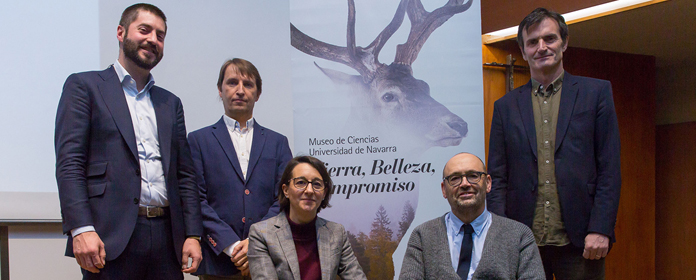"It is more expensive to wait and not act than to reduce emissions to curb climate change".
Four experts from the University of Navarra participate in roundtable held on the occasion of the World Climate Summit in Madrid.

PHOTO: Manuel Castells
"The programs of study agree that it is more expensive to wait and not act than to reduce emissions to curb climate change," says Kepa Solaun, partner director of group Factor and professor of Economics and Environment at the University of Navarra.
The expert participated along with three other specialists from the academic center in the roundtable "Climate change, a vision multidisciplinary" which addressed the issue of climate from science, architecture, communication and Economics. The event, organized by the Scientific Culture Unit of the University of Navarra and the Science Museum, was held on the occasion of the World Climate Summit in Madrid.
Climate change, according to Kepa Solaun, is "a challenge of enormous magnitude due to its global nature and its impact on essential aspects of our economic system". In his opinion, curbing its impact is less costly than addressing its impacts, but "requires coordination, generosity and vision that puts the institutional capacity of the international community at test ". He added that there are multiple options available for companies, governments and citizens to reduce their emissions "with low or even negative costs".
Inmaculada Pascual, Vice-Dean of the School of Sciences, moderated the roundtable and introduced topic as "a complex problem, which must be approached from a holistic perspective and all factors must be taken into account".
Jesús Miguel Santamaría, advisor scientist of the European LifeWatch-ERIC infrastructure and professor of Air Pollution and Chemistry, stated that the generalized increase in global temperature is a clear fact: "Ten of the warmest years since records have been kept have been in the 21st century. Since the Industrial Revolution, greenhouse gas emissions are causing a significant alteration".
Massive and uncontrolled urbanizationFor his part, Bienvenido León, Professor of Science Journalism at the University of Navarra, spoke of the fundamental role of the media: "It is necessary that climate change is definitively installed in the diary information and increase its presence in the media, as an issue close to citizens and that is connected to everyday life".
Finally, the Navarre architect Patxi Mangado spoke, stressing that the problem lies in the "massive and uncontrolled urbanization, lacking in planning, infrastructure and services, which is a disastrous response to the massive influx of rural population". For the architect, this arrival causes disastrous effects on the human, physical and environmental environment.




